Information
Hong Kong is an internationally recognized financial center strategically placed in a high growth region with an abundance of professional expertise and multinational companies with fund-raising opportunities.
Website: http://www.hkchcc.org
Location: Hawaii San Francisco Hong Kong China
Members: 21
Latest Activity: Apr 13, 2014
Discussion Forum
PCI-compliant credit card transactions across the Great Firewall 1 Reply
My understanding is that the way PCI-compliant CC transactions happen now in China is that the foreign company interested in selling you stuff has a VPN endpoint inside the Great Firewall that their…Continue
Tags: ecommerce, credit card transactions, great firewall, pci, pci compliance
Started by Nate Sanders. Last reply by Daniel Leuck Sep 18, 2013.
Marcus interviews director of new China documentary film
Hey Guys, Through my role as Asia beat editor for Vagablogging.net (a travel site), I got the chance to watch a new documentary, "The China Question." I interviewed the filmmaker and posted it…Continue
Tags: documentary, china
Started by Marcus Sortijas Apr 8, 2011.
China's provinces have bigger economies than entire countries 1 Reply
Not that we need any more convincing that China is a rising superpower, but here's a new angle: the mainland provinces have economies that rival whole nations.…Continue
Started by Marcus Sortijas. Last reply by Brian Mar 25, 2011.
Will China become number one in software outsourcing this decade? 13 Replies
I believe China will surpass India in terms of software outsourcing within the next ten years. Although India has a 20 year head start, the English advantage and a skilled workforce, they haven't…Continue
Tags: software development, China, India, IT, outsourcing
Started by Daniel Leuck. Last reply by Daniel Leuck Oct 24, 2010.
Comment Wall
Comment
-
Comment by Johnson Choi on June 11, 2011 at 12:57pm
-
Hong Kong: Eco Expo Asia - Ideal platform for green partnership - Hong Kong 26-29 October 2011 - Deadline for application is June 17 2011
http://www.hkchcc.org/Event.htm
"We are exhibiting here for the first time, looking for a Hong Kong partner to explore the mainland market. For the investment aspect, Hong Kong is the best place to start. We found this fair useful. The quality of visitors is good, and we have made a dozen promising contacts. This is also a platform for us to collect market intelligence about the mainland. We will be back next year, hopefully with our new Hong Kong partner." (Marcus Bicknell, Partner, Technical and Marketing, RainWater Harvesting Ltd, United Kingdom, talking about last year’s fair.)
Speaking at the networking session, Hon. Edward Yau, JP, Secretary for the Environment, HKSAR says the National 12th Five-Year Plan sets out China's strategies for sustainable development, ranging from energy efficiency and renewable energy to pollution control, climate change and green consumerism. Hong Kong, as a financial platform, can invite overseas companies with green expertise to explore opportunities for partnership in Hong Kong.
-
Comment by Johnson Choi on May 28, 2011 at 11:25am
-
Saturday, 5/28/2011 4:30pm FOCUS Pathways to Paradise: Helping Hawaii High Tech Companies into Asia (Hong Kong and China), Length: 0:28 minutes
Tina Quizon host Hawaii & Global Leaders of Human Potential, Advancement, Economics, Innovation & Technology
http://olelo.granicus.com/MediaPlayer.php?publish_id=88
-
Comment by Johnson Choi on May 12, 2011 at 5:02am
-
http://www.hkchcc.org/biz-hongkong.htm
Hong Kong Start-up Support for tech-related start-ups
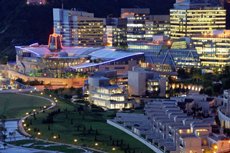 State-of-the-art facilities at Hong Kong Cyberport attract tech-related start-ups
State-of-the-art facilities at Hong Kong Cyberport attract tech-related start-ups
Setting up a new company can be a daunting business. But for entrepreneurs thinking of taking the plunge, Hong Kong is about as welcoming an environment as they'll find. That's partly because of the ease of setting up and running a company in the city, and the broad range of reasonably priced professional services available. But it's also due to the wealth of information, advice, even financial help provided by the government and local trade bodies.
Hong Kong's business-friendly environment makes setting up a company a cinch, according to one local entrepreneur. "The whole process was pretty painless," says Jimmy Gao, founder of QTrack.hk. Set up last year, the company sells its own proprietary customer-management system aimed, initially, at the restaurant industry. "It was all up and running in five to six days."
Mike Ko, founder of time-based online event-searching business timable, adds that straightforward procedures for business registration, taxation and audit meant he didn’t need fulltime professional help to set up his company.
One-Stop Shop
But more important still is the raft of services available specifically for start-up businesses. The Hong Kong Trade Development Council's (HKTDC) Entrepreneur Day, 20-21 May, is just one of the many forums in which new and potential business owners can get information and take advantage of networking opportunities.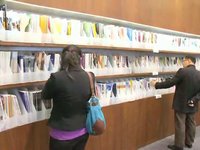 Video Presentation (5 minutes) http://www.vimeo.com/23635771
Video Presentation (5 minutes) http://www.vimeo.com/23635771
Another is the HKTDC's SME Resource Centre, which was launched last September. Located in the Hong Kong Convention and Exhibition Centre, the 15,000 square-feet venue is a "one-stop resource centre, especially for start-ups," said the HKTDC's Senior Manager, Customer Service, Katherine Lo. It houses a trade library of 8,000 business publications and reference material, including business directories, market reports and trade-fair catalogues. It also offers access to Kompass and other electronic business databases, which are usually out of the financial reach of start-ups.
The SME Centre also features meeting rooms and other facilities available to small businesses. It offers workshops on a range of themes, including entrepreneurship and doing business in China. SMEs can also take advantage of the centre’s advisory services, one focusing on general SME issues, the other on the Chinese mainland. Government officials from Guangdong, Beijing, Shanghai and Fujian are based in its offices, and meetings can be arranged as part of the service.
Saving Time and Money
Cedric Delzenne, who used the SME Resource Centre extensively to launch his online fashion retail business Shop des Créateurs, last October, says he found the China business information particularly helpful.
Cedric Delzenne used the HKTDC SME Resource Centre extensively to launch his online fashion retail business, Shop des Créateurs, last October
"Creating my own company was something I'd had in mind for a long time, and when I moved to Hong Kong, I quickly realised it was the perfect place to do this," says Mr Delzenne, a former management consultant in his native France. "Because of the people I was able to meet, it was easy to concentrate on the business and make it grow rather than spending time on administration. I was even able to apply for an investment visa myself," he says.
"Being in Hong Kong didn’t only save time, it also saved money, because I had a limited budget for the launch, and I was able to spend it on a top-notch website rather than on lawyers and so on. Hong Kong is also a very good place for web developers. I was very pleased with what I got; for the same site in Europe, I think I'd have had to pay twice as much."
He adds that the French Chamber of Commerce also helped to connect him with useful contacts through events, something that's common at the city's many other national chambers. There are also a number of organizations that cater specifically to start-ups, providing everything from networking get-togethers to office space, including BootHK and StartUpshk, which has been running the popular Start-Up Saturday events (now moved to Mondays).
Incubating Business
The Hong Kong Government's Trade and Industry Department also provides small businesses, including start-ups, with free business information and consultation services. The Support and Consultation Centre for SMEs offers the services in collaboration with 100 industrial and trade organisations, professional bodies and other government departments.
Located in Kowloon, the centre offers a start-up information service, including requirements on government licences and permits, methodology in drafting business plans, market information, costing and expenditure analyses. There's also a business advisory service for prospective entrepreneurs and free SME seminars and workshops.
For IT-related start-ups, Hong Kong Cyberport provides low-cost grade-A office space, and high-bandwidth Internet access. Its Digital Media Centre includes media production facilities for small companies. It also provides funding: unconditional grants of HK$100,000 to entrepreneurs. "All you need is a good business idea," says Cyberport Chief Technology officer David Chung.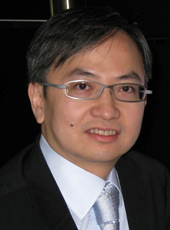 David Chung, Chief Technology officer, Hong Kong Cyberport
David Chung, Chief Technology officer, Hong Kong CyberportIts incubation program, which is currently helping about 50 companies, can provide additional subsidies of up to HK$300,000, plus two years' free rent. Companies receiving support from the program don't have to base themselves at Cyberport. There's a similar incubation programme on offer at the Hong Kong Science and Technology Parks.
Cyberport is also setting up an office in Shanghai, and offering office space there as part of a soft-landing program for Hong Kong businesses looking to tackle the mainland market.
In addition, the Vocational Training Council runs a Business Start-up Centre to provide office facilities and administrative assistance to new businesses, while the Hong Kong Productivity Council (HKPC) runs several programs aimed at helping small businesses improve their efficiency. "For entrepreneurs, they have to learn how to eliminate waste, control expenses and cut unnecessary costs," says Ricky Leung, Principal Consultant in the HKPC's business management division. The body also helps business with branding, by matching new businesses with royalty-free work from local designers. "For entrepreneurs, it's quite difficult to put a lot of money into advertising and promotion," says Mr Leung.
-
Comment by Johnson Choi on May 8, 2011 at 6:21am
-
For the tech firms that need fund could benefit from the direct investment from China, interested, please read on or go to the following link:
http://www.hkchcc.org/biz-china.htm
May 10 2011
Hawaii, California and USA could benefit from the Wenzhou China overseas investments - individuals can invest up to US$3 million (HK$23.4 million) in a single overseas project, rising to US$10 million for groups
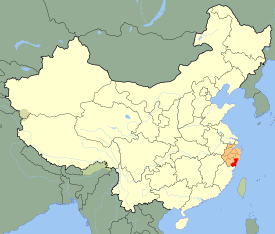
http://en.wikipedia.org/wiki/Wenzhou
The mainland's currency regulator is keeping an eye out for speculators in a pilot scheme that allows individuals in Wenzhou to invest overseas.
The State Administration of Foreign Exchange has yet to decide whether to include stock trading in the scheme, deputy director Wu Shuiping said yesterday.
Authorities in Wenzhou said at the start of the year individuals can invest up to US$3 million (HK$23.4 million) in a single overseas project, rising to US$10 million for groups. But investments are banned in overseas stock markets, real estate, energy and mining. Agricultural, educational and wine sectors could benefit from the China investment.
The developments are drawing close attention in Hong Kong as approval for stocks would accelerate the so-called "through-train" policy that allows funds to flow into the local market.
Wu also warned of the impact on inflation from burgeoning foreign exchange reserves that have hit about US$3 trillion.
That comes as Zhang Anyuan, a director at the National Development and Reform Commission, said the People's Bank of China lost US$271.1 billion over the past seven years in investments using foreign exchange reserves.
Zhang estimated the loss to hit US$578.6 billion if the yuan appreciates to six against the US dollar. The yuan gained 0.05 percent to 6.4933 yesterday.
At present, the mainland is the largest investor in US treasury bills.
Zhang suggested diversifying the risk "as soon as possible."
The news comes as the Ministry of Commerce announced that foreign direct investment hit US$30.3 billion in the first quarter and involved 5,900 firms.
Hong Kong is the top investor in terms of both number of companies and investment amount, with 2,767 firms and a total investment of US$17.9 billion.
China ranks 2 as clean tech producer, USA is No 17
Denmark earns the biggest share of its national revenue from producing windmills and other clean technologies, the United States is rapidly expanding its clean-tech sector, but no country can match China's pace of growth, according to a new report obtained by The Associated Press.
China's production of green technologies has grown by a remarkable 77 per cent a year, according to the report, which was commissioned by the World Wildlife Fund for Nature and which will be unveiled on Monday at an industry conference in Amsterdam.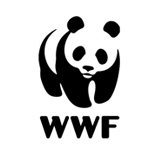
"The Chinese have made a conscious decision to capture this market and to develop this market aggressively," said Donald Pols, an economist with the WWF.
Denmark, a longtime leader in wind energy, derives 3.1 percent of its gross domestic product from renewable energy technology and energy efficiency, or about euro6.5 billion ($9.4 billion), the report said.
China is the largest producer in money terms, earning more than euro44 billion ($64 billion), or 1.4 percent of its gross domestic product.
The US ranks 17 in the production of clean technologies with 0.3 percent of GDP, or euro31.5 billion ($45 billion), but those industries have been expanding at a rate of 28 percent per year since 2008.
"The US is growing substantially, so it seems the policy of (President Barack) Obama is working," Pols said. But the US cannot compare with China, he said.
"When you speak to the Chinese, climate change is not an ideological issue. It's just a fact of life. While we debate climate change and the transition to a low carbon economy, the debate is passed in China," Pols said. "For them it's implementation. It's a growth sector, and they want to capture this sector."
The report was prepared by Roland Berger Strategy Consultants, a global firm based in Germany. It gathered data on 38 countries from energy associations, bank and brokerage reports, investor presentations, the International Energy Agency and a score of other sources. It measured the earnings from producing renewables like biofuels, wind turbines and thermal equipment, and energy efficiency technology such as low-energy lighting and insulation.
"Clean technologies are really growing fast, but China is responsible for the majority of that growth," said Ward van den Berg, who compiled and analyzed the data for the consultancy firm.
Until recently, Chinese massive production of solar cells was aimed at the export market, but they are now making solar systems for the home market, as they have been doing for several years in wind energy, Van den Berg said.
Following Denmark and China, other countries in the top five clean-tech producers, in terms of percentage of GDP, are Germany, Brazil and Lithuania, the report said.
-
Comment by Johnson Choi on May 6, 2011 at 6:30am
-
http://www.hkchcc.org/hongkong-china.htm

Liang Weimin, holding his son in his arms, becomes the 100 millionth visitor of Ocean Park in Hong Kong on Feb. 18, 2011. TripAdvisor, the world's biggest travel website, released the results of the "2011 Travelers' Choice World Destinations" poll recently. Chinese Hong Kong, which garnered more than 1 million votes from travelers, has been listed as one of world's best tourism destinations in 2011. It is also the only Asian city named on the list. The world's top ten best tourism destinations in 2011 are: 1. Cape Town, South Africa; 2. Sydney, Australia; 3. Machu Picchu, Peru;4. Paris, France; 5. Rio de Janeiro, Brazil; 6. New York City, United States; 7. Rome, Italy; 8. London, United Kingdom; 9. Barcelona, Spain; 10. Hong Kong, China.
Hong Kong remained the most competitive city in China – but its lead over other cities was narrowing, according to a survey released on Friday by a leading mainland think tank. For six years in succession, Hong Kong has been named first in the annual survey conducted by the Chinese Academy of Social Sciences. However, the academy said Shanghai and Beijing – which came second and third respectively – were catching up. The survey said Hong Kong retained the edge in human resources, governance and financial management. But its measured level of happiness dropped 73 places to 271 among the 294 cities surveyed, with a widening wealth gap having the potential to undermine social stability. The survey also said Hong Kong was slow in restructuring its economy, and needed to increase research and development in technology. “Technological innovation is the core element of competitiveness in today’s world. In Hong Kong, some people think it is a must to pursue the development of high-end technology but some do not. This thinking may weaken its competitive edge,” the report said.
-
Comment by Johnson Choi on April 3, 2011 at 4:41am
-
April 3 2011 3:19am
Since the Japan Earthquake more than 2 weeks ago, we could witness cities and countries took actions to help.I have read daily news articles on how the Japan earthquake will impact on Hawaii's economy. Since there is NO visa requirements for Japanese National to come here, why not come to Hawaii? What did our Federal and State Government offering the Japanese to help them to relocate to Hawaii?There is another city across from the Pacific taking very positive steps in the past 2 weeks.1) Offering work VISA to more than 250 business executives located there is just 2 weeks time.2) Raise more than US$12.5 million for the Japanese earthquake relief in 2 weeks and climbing fast.3) Hotel rooms are booked solidIt is the City of Hong Kong.The Chinese word "danger" "危機" if you split up the word "危" = danger and "機" = opportunities.In Hawaii, rather than focus on the negatives, may be we should take some positive action and see if we can do what Hong Kong has been doing for the past 2 weeks?April 3 2011
Hong Kong snaps up top-ranking professionals in aftermath of quake - Fast-track work visas for fleeing Japan executives By Phyllis Tsang
More than 250 top-ranking professionals from Japan have been given Hong Kong work visas in just two weeks under an unprecedented fast-track approval system put in place following last month's devastating earthquake and tsunami.
As well as the 270 approvals, the Immigration Department received a further 300-plus inquiries from professionals in Japan worried about radiation from the crippled Fukushima nuclear fuel plant and further earthquakes.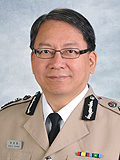 "Many applicants were very glad that we could grant the visa within two days," said newly appointed director of immigration Eric Chan Kwok-ki as he disclosed the figures.
"Many applicants were very glad that we could grant the visa within two days," said newly appointed director of immigration Eric Chan Kwok-ki as he disclosed the figures.
They are the first official confirmation of a trend which has been apparent as Japan struggles to cope with the aftermath of the twin disasters which have left 11,800 people confirmed dead and 15,500 missing and with the crisis at the Fukushima plant 250 kilometres northeast of Tokyo. Nuclear power shutdowns triggered rolling power blackouts across much of the country.
Chan said fast-track approval was necessary because professionals leaving Tokyo were eyeing other jurisdictions as potential alternatives.
He said most of those given visas were senior managers of multinational companies in Japan, mainly in the financial sector. Their titles include chief executive officer, vice-president, senior investment manager, analyst and strategist.
"We have received inquiries from multinational companies and human resources companies applying for visas for their staff working in Japan, who would like to leave Japan after the quake," Chan said.
"Those applicants can bring economic benefit to Hong Kong. We hope that they consider long-term settlement in Hong Kong."
The 270 applications were received and approved between March 17 and Thursday.
An assistant director of immigration was appointed to speed up the process so that applicants could have a visa within two days. Chan said it was the "first time in immigration history" such procedures had been put in place. It usually took six to eight weeks to process an application.
"Those applicants might decide to go to other countries if we did not provide a speedy approach," he said.
The applicants included Europeans, Americans and Japanese working in Japan. A large number of them were earning between HK$100,000 and over HK$200,000 a month, according to the Immigration Department.
One Tokyo executive who arrived in Hong Kong told the Post that executives in Japan were fleeing to Hong Kong, Taiwan, and even far away as Australia and the United States after the quake. The man said worries about radiation were not the only reason people were leaving Tokyo. Their business had been affected as offices were badly damaged. "Time is money in my business," he said.
Among the 270 applicants granted a one-year visa, 158 were granted on an employment or investment basis, 62 were for their dependants, one for studying, and 49 applied to extend their visas as they were in Hong Kong right after the earthquake happened.
Last year, 26,881 working visas were granted for employment or investment in the city and 20,385 dependant visas in the same period.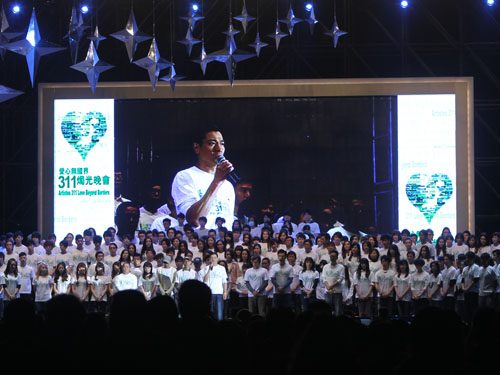
Hong Kong "Song of Hope" Raised HK$100 million (US$12.9 million) for Japan Earthquake Victims - Singer-actor Andy Lau Tak-wah is backed by a huge choir as he performs at the Artistes 311 Love Beyond Borders concert in aid of Japan in Victoria Park last night.
Donations to earthquake victims in Japan continue to pour in, taking the total raised in Hong Kong to more than HK$100 million. That does not include the money raised last night at the star-studded show in Victoria Park - Artistes 311 Love Beyond Borders. The three-hour event featured 173 local and overseas artists, including some from Japan, such as veteran singer-actor Masatoyo Nakamura. Some of them performed while others manned the 150 lines of the donation hotline to take telephone pledges from viewers watching the show live on the city's free-to-air and pay TV stations and people listening on radio. Within half an hour, HK$6.8 million was raised, but with the hotline running until 11.30pm, organisers were hoping to pass the HK$20 million target, with all proceeds going to the Salvation Army.
A minute's silence was observed for victims of the quake before the show started shortly after 7pm in front of an audience of 8,000. Movie superstar Jackie Chan was among the Hong Kong celebrities. He said: "At the core is the belief that we care for one another, especially in difficult times.
Love knows no borders." As well as providing financial help, the event was also to offer hope and support to the Japanese people and send a message of courage in the face of hardship. There was a front-row seat for Japan Consul-General Yuji Kumamaru and his wife, who couldn't contain their tears at the outpouring of sympathy for their country's plight. Up until last night, World Vision Hong Kong has raised HK$32 million, the Salvation Army HK$15 million, the Red Cross HK$70 million and Unicef HK$1.5 million.
Kumamaru earlier thanked everyone for their donations, saying all the money would be used to help the victims of the quake. "We are grateful and we appreciate all incoming donations and the organisations that are actively engaging in donation efforts," he said. While financial assistance was welcome, Kumamaru said: "We are not encouraging people to provide goods, not at this particular stage."
He said the country was still suffering from serious logistical problems due to its severely damaged transport network. "How to deliver the goods to the people in need is a big operational difficulty," he said. He added that there would be problems of co-ordination for local governments if a huge amount of goods arrived from overseas.
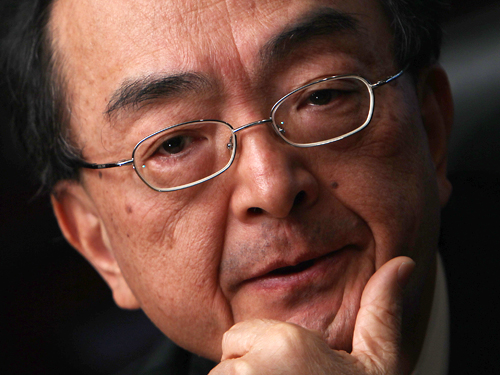
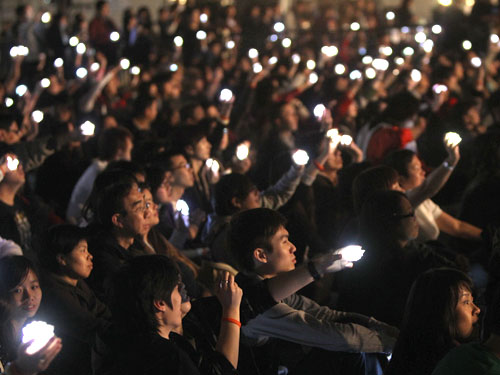
Quake may help to heal rifts in ties, says envoy - People take part in a concert at Victoria Park last night to raise funds for victims of the earthquake and tsunami in Japan. Consul general Yuji Kumamaru has been overwhelmed by the sympathy shown by Hongkongers. Consul general Yuji Kumamaru has been overwhelmed by the sympathy shown by Hongkongers. An earthquake, tsunami and nuclear radiation leak may have left Japan devastated but its gravest crisis since the second world war offers an opportunity to mend Japan-China relations, the country's representative in Hong Kong says. Consul general Yuji Kumamaru said he had been overwhelmed by the extent of sympathy and support shown by China, including Hong Kong, after the disaster. "When the immediate dealing is done, something struck me through this experience in that we are indeed very much connected; Japan and the outside world, Hong Kong and China," he said. His comments came yesterday as Tokyo released its annual diplomatic report, the Blue Book, which said relations were tense after the arrest of a Chinese fishing boat captain at the disputed Diaoyu Islands last year, but they were improving. China has supplied assistance including fresh water, fuel, food, first-aid supplies and other relief materials. Hong Kong has raised more than HK$100 million in donations and is sending counsellors offering psychological help for victims. Kumamaru, who was a minister and counsellor at the Japanese embassy in Beijing and consul general in Shanghai before coming to Hong Kong last year, said he hoped there would be a rainbow after the rain. "This is a difficult time for Japan and hopefully it is working in a positive way to bring both countries together," he said. "We feel very appreciative of the Chinese government and Chinese people which gives us a sense that we are part of Southeast Asia; that we are together. I hope that this sense of solidarity prevails both in China and Japan," he said. At odds over territorial and security issues, tension between China and Japan has prevailed for decades. Last September, the row over the arrest of the trawler skipper after a collision between his boat and Japanese coastguard vessels sparked protests in both countries and in Hong Kong. But Kumamaru said relations were not only on a government-to-government level. "It is a lot more complicated because of sentiment, history and closeness. How people feel about each other is a very important factor in managing the Japan-China relationship," he said. Kumamaru said the two nations should help each other to better prepare for regional disasters. In Hong Kong, the donations, the many origami cranes and banners with messages of support have moved Kumamaru. He said even without any publicity, more than 800 people went to the consulate to sign a book of condolence. Since the quake, Kumamaru has received a lot of encouragement from the Hong Kong government and people in the city. "Many times, as I get out of a taxi the driver will turn to me and say, `Good luck , I am sure that Japan will overcome over the problem'," he said. "I am deeply impressed.
-
Comment by Johnson Choi on March 27, 2011 at 5:23am
-
Urgent cable by China President Chiang Kai-shek to US embassy that could stop the Pearl Harbor Attacked-threw into rubbish bin http://www.hkchcc.org/hongkong-china.htm
http://www.facebook.com/notes/johnson-choi/urgent-cable-by-china-pr...
On December 2, 1941, a young Chinese intelligence officer in a cramped room in Chongqing decoded a message from Japan's Foreign Ministry to its ambassador in Washington: "Burn all secret codes and secret documents and move the embassy's deposits to the bank of a neutral country: the imperial government has decided at the highest level to take action."
Knowing the cables that had gone before, the officer concluded that Japan was about to attack the United States five days later at Pearl Harbour. He passed the information to his superior, who gave it to president Chiang Kai-shek. Chiang sent an urgent cable to the US embassy; its diplomats judged that the Kuomintang did not have the technology to crack Japan's secret codes and threw the cable into the rubbish bin.
The officer, Chi Buzhou , was the master code-breaker of China's intelligence during the second world war.
On April 13, 1943, he decoded a cable from the headquarters of the Imperial Japanese Army saying that Isoroku Yamamoto, commander of the Combined Fleet and the man who led the attack on Pearl Harbour, would be flying from Rabaul to Ballale airfield, in the Solomon Islands, on the morning of April 18.
This time the Americans believed him and sent a squadron of fighter aircraft to intercept the Mitsubishi aircraft with Yamamoto on board and the six escorting Zero fighters. Yamamoto's plane crashed into the jungle. The death of their most famous admiral was a major psychological blow to the Japanese public, who were only told of the event on May 21.
Chi is one of the most important unsung heroes of China's war effort. Only now is he achieving the recognition he deserves thanks to a popular television series, Feng Yu, based on his life. The series aired on China Central Television's national Channel Eight last month and reached a peak of No2 in the ratings. Now CCTV is selling it to city and provincial cable stations.
Before the series, few Chinese had ever heard of him, in part because he worked for the Kuomintang government and in part because of the secrecy surrounding what he did. His personal story is worthy of a Shakespeare play.
Chi was born in 1908 into a large peasant family in Minqing, in rural Fujian province. His family was so poor that he did not go to school until he was 10, with financial assistance from one of his older brothers. An outstanding student, he completed primary school in three years and went to study at one of the best middle schools in the provincial capital, Fuzhou .
In 1927, he earned a place at Tokyo Imperial University, the most famous institute of higher learning in Japan, where he finished a degree in electrical engineering. Then he did a degree in industrial studies at Waseda and met and married the love of his life, Akiko Shirohama.
Chi took a part-time job at the Chinese embassy in Tokyo and, introduced by a fellow student, joined the Kuomintang. He wrote nearly 20 articles for a magazine published by Chinese students in Japan.
In July 1937, the Japanese military launched its attack at the Marco Polo bridge outside Beijing. "I felt that an all-out war between China and Japan was imminent and that, as a Chinese, I could not go on living there and decided to return home at once," he wrote in his memoirs, completed in 1986. Shirohama's family told her to choose between them and her husband from the "enemy country": she chose Chi and her family cut her off.
With their three children, they boarded a ship in Kobe on July 25, 1937. The police boarded the ship and detained them on the pier. Only when a Japanese friend came to vouch for them and paid fees demanded by the police were they able to reboard, minutes before the ship left for Shanghai.
After arrival, they went to the capital, Nanjing (then Nanking), where they found everyone frantically preparing to escape the arrival of the Japanese. Chi found a guest house for students who had returned from Japan. "There was immediately a Japanese air raid and no bomb shelter. The five of us hid under a bed with a cotton blanket."
A fellow returnee from Japan invited Chi to join a counter-intelligence unit set up to break Japanese military and civil codes. "I told him that, in Japan, I had studied electrical engineering and economics. I knew nothing about codes. But he quoted President Chiang as saying that a person who could break secret codes was like adding an army of over 100,000 troops. I was very moved. I was young and patriotic and agreed. It was an extremely difficult mission, to master something of which I had no knowledge."
The unit had been set up in Chongqing, the wartime capital, by an American cryptologist, Herbert Yardley, who had founded MI-8, a US military intelligence unit, in June 1917. In 1931, Yardley wrote a book, The American Black Chamber, about his experiences, which became a best-seller around the world.
President Chiang liked the book so much that he offered Yardley an annual salary of US$10,000 to set up a similar unit in China. In November 1938, he arrived in Chongqing, set up a team to crack Japanese codes and recruited more than 30 Chinese who had studied in Japan, including Chi.
Chi was very strong in mathematics and, with an excellent memory, was able to remember figures. He made his first breakthrough in March 1939, when he read a cable from the Japanese Foreign Ministry to its offices around the world. The chief of staff was delighted and put Chi in charge of a team of 45 people. They broke codes that detailed plans to bomb Chongqing.
"We threw ourselves into the task," Chi recalled later. "For us, there was no day or night. We had to succeed in our mission. We were exhausted but it was a joyful kind of exhaustion, with a great sense of achievement."
Chi found that the code was a mixture of English letters, Japanese writing and numbers, with two letters denoting a Chinese or Japanese character. He worked out, for example, the letters to denote units of the Chinese army, the number of soldiers and the quantity of ammunition. (west wind tense) meant that relations with the US were bad: (clear in the north) meant that relations with the Soviet Union were improving.
On a boat from Hong Kong to Haiphong, Yardley met a man who introduced himself as a "German Jewish engineer" and said he was going to Chongqing "because he liked the food". Yardley was suspicious and sent an agent to the man's hotel to spy on him. One evening, the "engineer" sent messages by telegraph. He was arrested and confessed that he was a Japanese agent preparing for a team of special forces to parachute in and kidnap or assassinate Chiang.
Yardley stayed in Chongqing until March 1940, when poor health and revelations in The New York Times forced him to return home.
In April 1940, Chiang set up "the Chinese black chamber", with 500 operatives divided into six units, with the mission of breaking Japanese military and diplomatic codes. It later broadened its task to reading the secret messages of the Communist Party, the competing factions in the KMT and the British, American and Soviet missions in China.
From May 1941, Chi found a sudden heavy increase in cable traffic between Tokyo and its consulate in Hawaii, including requests for information on the numbers and position of naval vessels in Pearl Harbour, when they went out for manoeuvres, which was the rest day - Sunday - and the weather situation. It was these cables, plus the one on December 2 calling for the burning of the codes and documents at the Washington embassy, that caused him to predict, correctly, the attack on Sunday, the seventh.
In October 1942, he decoded an order to send a Japanese air squadron to leave a base in Burma and bomb Calcutta. This was passed to British air command in New Delhi, enabling it to intercept and destroy the squadron. That month, Chi also discovered a Japanese plan to shoot down a plane carrying Sun Ke , the son of Sun Yat-sen. He managed to reach Sun at Chongqing airport just as he was about to board. He turned back - but the plane continued on its journey and was shot down; all those on board were killed.
In October 1943, Chi was transferred to another division of the army to provide training and was promoted to the rank of major. After the civil war between the Nationalists and Communists broke out, he did not want to take part and took his family to his hometown in Fujian. He later took a job in a bank in Shanghai. He decided against following the KMT government to Taiwan.
-
Comment by Johnson Choi on March 18, 2011 at 7:02am
-
Excellent Opportunities for Hawaii's Film Makers to use Hong Kong to launch their projects in Asia & China using the CEPA (free trade agreement between Hong Kong and China) http://www.vimeo.com/21201088
-
Comment by Johnson Choi on March 17, 2011 at 6:35am
-
China's 12th Five-Year Plan: Hong Kong's Advantage - Complete Information & Video Presentation http://www.hkchcc.org/newsletter.htm
-
Comment by Johnson Choi on March 4, 2011 at 8:03am
-
Foster design chosen for US$361 million Hong Kong's cultural hub - NO Hawaii Firm has submitted a bid? http://www.hkchcc.org/hongkong-china.htm
© 2025 Created by Daniel Leuck.
Powered by
![]()
 Wine-Biz - Hong Kong
Wine-Biz - Hong Kong
You need to be a member of Business in Hong Kong & China to add comments!